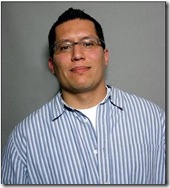In 2005, Brian Nichols, a fugitive who had murdered three people while escaping from a courthouse was on the loose in the Atlanta area. You might have heard about this on the nightly news or possibly how it ended. Here’s a summary from Wikipedia:
It was later learned that around 2:00 a.m. on March 12 Nichols approached a woman named Ashley Smith in the parking lot of the Bridgewater Apartments. He pointed a gun at her and said “If you do what I say, I won’t kill you”. He forced her inside her apartment and reportedly told her that he was a wanted man. Nichols forced her into the bathroom and tied her up with an electrical cord and duct tape. He placed a hand towel over her head while he took a shower (so that she wouldn’t have to watch him). She was sitting on a stool with the towel around her eyes when she told him about her five-year-old daughter Paige and how she was supposed to visit her that day. Thinking she may never see her daughter again, she tried to reason with him.
Smith was held hostage for several hours in her apartment, during which time Nichols requested marijuana, but Smith told him she only had “ice” (methamphetamine). In her book Unlikely Angel: The Untold Story of the Atlanta Hostage Hero, Smith revealed that she “had been struggling with a methamphetamine addiction when she was taken hostage,” and the last time she used meth “was 36 hours before Nichols held a gun to her and entered her home.” Nichols wanted her to use the drug with him, but she refused.”[13] Instead, she chose to read to him from the Bible and Rick Warren’s The Purpose Driven Life. She tried to convince Nichols to turn himself in by sharing with him how her husband “had died in her arms four years earlier after being stabbed during a brawl.”[14] Smith also writes that she asked Nichols “if he wanted to see the danger of drugs and lifted up her tank top several inches to reveal a five-inch scar down the center of her torso — the aftermath of a car wreck caused by drug-induced psychosis. She says she let go of the steering wheel when she heard a voice saying, ‘Let go and let God.’”[14] When news of his crimes was reported on television, Nichols looked to the ceiling and asked the Lord to forgive him. Nichols said he needed to get the stolen truck away from the apartments so he told Smith to follow him in her car while he drove Agent Wilhelm’s pickup truck away from the apartment complex. She asked whether she could bring her cell phone and he said she could but she never placed a call for help. She picked him up after he dropped off the truck and drove back to her home with him, she said. Her decision had a purpose: She feared that he would kill more people if she did not do what he said. She had taken it upon herself to end the manhunt. After they returned to her apartment Smith cooked breakfast for Nichols. She began to ask him if she could leave to go see her daughter and he finally agreed. When Nichols let Smith leave her apartment that morning to visit her daughter, Smith placed a call to 9-1-1 at 9:50 a.m.
I’m not encouraging the use of Meth or the Purpose Driven Life to desuade your attackers, but it’s another example of a person reacting to a dangerous situation nonviolently.
 In 2005, my senior year at Wheaton College, in my ‘Christian Thought’ class, I participated in a debate on the topic: “Christians can Support and Participate in War.”
In 2005, my senior year at Wheaton College, in my ‘Christian Thought’ class, I participated in a debate on the topic: “Christians can Support and Participate in War.”

 This is a long excerpt from an amazing book, The Powers That Be, by Walter Wink. After coming to a belief, simply through reading Jesus’ call to “love your enemies”, that violence was not an appropriate action for Christians, a friend of mine on my dorm floor gave me this book. It was formative in helping me make further sense, not only of Jesus’ teachings, but also of the rich history of nonviolence in the Christian faith.
This is a long excerpt from an amazing book, The Powers That Be, by Walter Wink. After coming to a belief, simply through reading Jesus’ call to “love your enemies”, that violence was not an appropriate action for Christians, a friend of mine on my dorm floor gave me this book. It was formative in helping me make further sense, not only of Jesus’ teachings, but also of the rich history of nonviolence in the Christian faith.